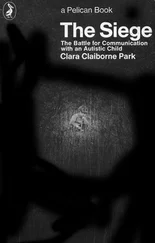Clara Park - Exiting Nirvana
Здесь есть возможность читать онлайн «Clara Park - Exiting Nirvana» весь текст электронной книги совершенно бесплатно (целиком полную версию без сокращений). В некоторых случаях можно слушать аудио, скачать через торрент в формате fb2 и присутствует краткое содержание. ISBN: , Жанр: Психология, на английском языке. Описание произведения, (предисловие) а так же отзывы посетителей доступны на портале библиотеки ЛибКат.
- Название:Exiting Nirvana
- Автор:
- Жанр:
- Год:неизвестен
- ISBN:0-316-69117-8
- Рейтинг книги:4 / 5. Голосов: 1
-
Избранное:Добавить в избранное
- Отзывы:
-
Ваша оценка:
- 80
- 1
- 2
- 3
- 4
- 5
Exiting Nirvana: краткое содержание, описание и аннотация
Предлагаем к чтению аннотацию, описание, краткое содержание или предисловие (зависит от того, что написал сам автор книги «Exiting Nirvana»). Если вы не нашли необходимую информацию о книге — напишите в комментариях, мы постараемся отыскать её.
All illustrations are by Jessy Park.
Exiting Nirvana — читать онлайн бесплатно полную книгу (весь текст) целиком
Ниже представлен текст книги, разбитый по страницам. Система сохранения места последней прочитанной страницы, позволяет с удобством читать онлайн бесплатно книгу «Exiting Nirvana», без необходимости каждый раз заново искать на чём Вы остановились. Поставьте закладку, и сможете в любой момент перейти на страницу, на которой закончили чтение.
Интервал:
Закладка:
The lengths are carefully measured to correlate with the appropriate number. Each digit, Jessy told me later, equals one inch, each exponent (squares, cubes, et cetera) a half-inch. Three, the smallest number, occurs twice; the inch-long lengths of icing are labeled «rice pudding with lime». The largest number is one even a mathematician would find bizarre:

(Seven squared to the infinity power to the infinity power plus i, times 37 squared to the infinity power to the infinity power plus i.) It is represented by a 9 1/2-inch length; its icing equivalent, carefully written on the tube, is «lemon lemon lemon lime little tiny bit orange orange orange lemon». The composition of the 8 1/2-inch length is even more complicated: «double dutch little bit lemon- lemon lemon lemon lemon lime lime lime lime lime lime lime lime- lime lime lime». And Jessy colored the icing as carefully as she calculated the numbers, in permutations and combinations that boggle the mind. The next tube is identical except that «little bit» becomes «little tiny bit»; predictably, the little lemon lime-green areas that stripe the brown chocolate have been reduced by half to correspond. I could describe the others, but somehow I don’t think I will.
The correlations came first. The explanations emerged only gradually, as her language grew more adequate to what she had in her head. We learned that flavors correlated with the times she «looked at the clock by mistake». They correlated with the number of times she soaped herself in the bath, o light blueberry, i lime, 2 lemon, 3 orange, 4 strawberry, 5 vanilla, 6 licorice, 7 chocolate, 8 grape, 9 or more, blueberry again. «Dark lemon», «dark lime», and «lime with a little bit rice» correlated with three kinds of «striped» cloud. Even her pencil line proclaimed the system. «Why is the window all wiggly?» I asked of a drawing showing Jessy in bed and the moon behind her favorite tree. It was because of the flavors, she said, wiggly for lime, three-eighths wiggle for lemon lime, whole wiggle for rice pudding. How many other correlations were there that we missed?
The system expanded to include new experience. A year later, when the Christmas catalogs came, the various delicacies received numbers, 137 for solid chocolate, 173 for chocolate with nuts, 337 for chocolate with coconut. Dobosh torte was 3; with cherries it was 7 ∞ +1. That same number, she told her father, was correlated with airplane vapor trails: if two vapor trails crossed, the cloud at the crossing point yielded 7 2∞ +2. The exponential 7 was «rice pudding with lime lime»; a 3 was rainbow-colored «when cloud has color outside looks like rainbow and white inside». In the system’s last stage Jessy correlated colors, flavors, and numbers with her typing errors, and correlated them with «flavor cookies». A surreal connection? It proved to be wholly logical when Jessy drew herself with ten cookies, two on the floor. «And drop the cookies. That is a mistake». So both kinds of error were duly recorded in a Book About the Mistakes, in which the very word was given its permutations: «mistakable, mistake, mistaken, mistaker, mistakers, mistaking, mistook».
Then, gradually, numbers lost their magic. Three years later she could say, «They used to be important to me, about all the things, such as bath soaps, and wild berries, and too good music and crying silently and laughing silently». We heard no more about flavor tubes. Jessy’s emotions seemed independent of the weather. She stopped making books. She was doing more conventional art at school, and told us, echoing, I’m sure, what she’d been told, that she was now «too mature». For all we knew, the system was finished.
And yet, twenty years later, when we got out the tubes and suns and «all different kind of days» to show Dr. Oliver Sacks, it turned out it was still there. Under his gentle questioning it burgeoned anew. There had, she said, been more than twenty-nine days; Phil just hadn’t had room for them all. She named and described them. She added fifty-five new flavors, including dark rum, three kinds of «expresso», and tangerine. «There are lots of correlated!» she crowed, reaching the end of the list.
If the reader by now is experiencing some wandering of attention, that’s as it should be. For us normals, boredom is part of the experience of autism. We are, most of us, impatient with formal structures we cannot relate to the concerns of human life, and even mathematicians, who are sympathetic to such pure pleasures, expect them to lead to something more interesting than tireless and self-absorbed variations on the same theme. We taught Jessy to solve simple equations. Excited by her facility with numbers, Phil tried to teach her calculus. But she resisted, not because she couldn’t understand it, but because it had nothing to offer her and demanded much. Rather than repeating familiar processes, it insisted she move forward, beyond the security of the predictable into a realm in which she must accept, even invite, unexpected results. And that was exactly what Jessy did not want. Her systems were designed to eliminate the unexpected, to capture uncertainties in a net of connections, to reduce them to rule.
Marvelous yet sterile, they bespoke a mind which for all its vigor was severely limited. Kanner’s «preservation of sameness», Courchesne’s «difficulty in shifting attention», worked in tandem to restrict both the ability and the desire to initiate new activities. Chaining, lining up objects, sifting silly business — these had been the preferred pastimes of Jessy’s childhood. In adolescence she could still be content with repetitive activity, rocking in her rocking chair, bouncing her superball up and down (though she might use her new skills to graph the number of bounces). At least her systems were richer experientially than that. They could admit new elements — weather, typing lessons, words and their spellings. Some were pleasurable; many were not. Systems couldn’t banish the world’s distressing variability, but they could set it in order, as clouds, cookies, mistakes, and shining days and nights took their places, subjected to the mind’s control.
But Jessy’s in her forties now. Understanding most of what is said to her, much of what is said around her, much of what is done around her, she has much more to occupy her mind. She can think about her bank statements, about the estimated tax forms necessitated by her new Roth account, about what she’ll make for the upcoming potluck supper, about when to renew the permit for the landfill, about whether it’s time yet to order a new bag of basmati rice. I could make the list much longer, but I won’t; normal activities can seem pretty boring too. Yet Jessy doesn’t find them boring. She is as absorbed in noting them, remembering them, keeping track of them, as she once was in her systems. She finds her regularities now in the humdrum exigencies of the world around her. She is our authority on the schedule of public holidays, the rules governing the acceptability of donated blood, the times the bank and post office open and close. Collecting information, storing it, using it, communicating it, her mind is at work. That is enough. The bizarre glories of the system have faded, as glories so often do, into the light of common day. But we are content. The common day is the day we hold in common, the day we can share. «Come see!»
Chapter 6
«When I ten, that minus one!»
It wasn’t the most gracious way for an eleven-year-old girl to welcome the neighbors’ new baby, but it certainly showed a grasp of number. Jessy’s formulation provided yet another illustration of the social blindness that is at the core of autism. But just as arresting as her substitution of a numerical relation for a human one, or her use of the impersonal «that» to refer to a living, breathing baby, was the unexpected sophistication of her spontaneous subtraction. «Genius» is in general an overused word, never more so than in its casual application to autistic achievement. Jessy’s «minus one» was as accurate as it was inappropriate. But though it astonished, it didn’t come out of nowhere. Before squares, before primes, before 37’s and 73’s and 337’s, there had been years of the ordinary, grade school applications of number, as we worked to prepare her for what we hoped would be some sort of education beyond what we could give her at home. In fact we were preparing her, though we didn’t know it, for the calculations that would make possible the System. So I must briefly leave the teenage Jessy and trace the progress of that preparation.
Читать дальшеИнтервал:
Закладка:
Похожие книги на «Exiting Nirvana»
Представляем Вашему вниманию похожие книги на «Exiting Nirvana» списком для выбора. Мы отобрали схожую по названию и смыслу литературу в надежде предоставить читателям больше вариантов отыскать новые, интересные, ещё непрочитанные произведения.
Обсуждение, отзывы о книге «Exiting Nirvana» и просто собственные мнения читателей. Оставьте ваши комментарии, напишите, что Вы думаете о произведении, его смысле или главных героях. Укажите что конкретно понравилось, а что нет, и почему Вы так считаете.



![Майкл Азеррад - Come as you are - история Nirvana, рассказанная Куртом Кобейном и записанная Майклом Азеррадом [litres]](/books/392533/majkl-azerrad-come-as-you-are-istoriya-nirvana-ra-thumb.webp)



![Эверетт Тру - Nirvana - Правдивая история [litres]](/books/399241/everett-tru-nirvana-pravdivaya-istoriya-litres-thumb.webp)




